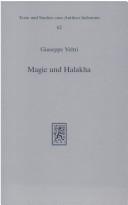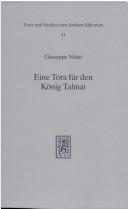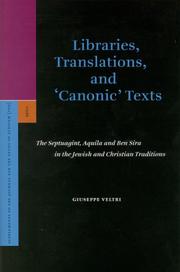| Listing 1 - 10 of 60 | << page >> |
Sort by
|

ISBN: 3161466713 Year: 1997 Publisher: Tübingen Mohr Siebeck
Abstract | Keywords | Export | Availability | Bookmark
 Loading...
Loading...Choose an application
- Reference Manager
- EndNote
- RefWorks (Direct export to RefWorks)
Esoteric sciences --- Jewish religion --- 296*24 --- Halacha --- 296*24 Halacha --- Jewish magic. --- Rabbinical literature --- History and criticism. --- Jewish magic --- Magic, Jewish --- Magic, Semitic --- History and criticism

ISSN: 07218753 ISBN: 3161459989 9783161459986 Year: 1994 Volume: 41 Publisher: Tübingen Mohr Siebeck
Abstract | Keywords | Export | Availability | Bookmark
 Loading...
Loading...Choose an application
- Reference Manager
- EndNote
- RefWorks (Direct export to RefWorks)
Theory of literary translation --- Bible OT. Pentateuch --- Bible --- Versions --- Septuagint --- Criticism, Textual --- 296*33 --- Hellenistisch-joodse literatuur--(algemeen) --- 296*33 Hellenistisch-joodse literatuur--(algemeen) --- Bible. --- Chumash --- Five Books of Moses --- Ḥamishah ḥumshe Torah --- Ḥumash --- Kitāb-i Muqqadas --- Mose Ogyŏng (Book of the Old Testament) --- Pentateuch --- Pi︠a︡toknizhīe Moiseevo --- Sefer Ḥamishah ḥumshe Torah --- Tawrāh --- Torà (Pentateuch) --- Torah (Pentateuch) --- Tʻoris xutʻcigneuli --- Ureta --- תורה --- Haftarot --- Septuagint. --- Criticism, Textual.

ISBN: 9004116869 9004498095 Year: 2002 Volume: 69 Publisher: Leiden Brill
Abstract | Keywords | Export | Availability | Bookmark
 Loading...
Loading...Choose an application
- Reference Manager
- EndNote
- RefWorks (Direct export to RefWorks)
Jewish magic --- Joodse magie --- Magic [Jewish ] --- Magie [Joodse ] --- Magie juive --- 296*6 --- Magic, Jewish --- Philosophy, Jewish --- Rabbinical literature --- -Hebrew literature --- Jewish literature --- Jews --- Philosophy, Israeli --- Magic, Semitic --- Joodse theologie en filosofie--(algemeen) --- History and criticism --- Philosophy --- -Joodse theologie en filosofie--(algemeen) --- 296*6 Joodse theologie en filosofie--(algemeen) --- -Jews --- Jewish philosophy --- Bible. --- Antico Testamento --- Hebrew Bible --- Hebrew Scriptures --- Kitve-ḳodesh --- Miḳra --- Old Testament --- Palaia Diathēkē --- Pentateuch, Prophets, and Hagiographa --- Sean-Tiomna --- Stary Testament --- Tanakh --- Tawrāt --- Torah, Neviʼim, Ketuvim --- Torah, Neviʼim u-Khetuvim --- Velho Testamento --- Criticism, interpretation, etc., Jewish. --- Hermeneutics --- Religious aspects --- Judaism

ISSN: 13842161 ISBN: 9004149937 9786611398781 1281398780 9047409019 9789004149939 9789047409014 Year: 2006 Volume: 109 Publisher: Leiden Boston Brill
Abstract | Keywords | Export | Availability | Bookmark
 Loading...
Loading...Choose an application
- Reference Manager
- EndNote
- RefWorks (Direct export to RefWorks)
Bible. --- Canon. --- Translating. --- Versions --- Septuagint. --- Aquila. --- 221.011 --- 223.7 --- Oud Testament: canon --- Wijsheid. Wijsheid van Jesus Sirach (Ecclesiasticus) --- 221.011 Oud Testament: canon --- Antico Testamento --- Hebrew Bible --- Hebrew Scriptures --- Kitve-ḳodesh --- Miḳra --- Old Testament --- Palaia Diathēkē --- Pentateuch, Prophets, and Hagiographa --- Sean-Tiomna --- Stary Testament --- Tanakh --- Tawrāt --- Torah, Neviʼim, Ketuvim --- Torah, Neviʼim u-Khetuvim --- Velho Testamento --- Ben Sira (Book of the Apocrypha) --- Book of Ben Sira (Book of the Apocrypha) --- Book of Sirach (Book of the Apocrypha) --- Ecclesiasticus (Book of the Apocrypha) --- Ḥokhmat Shimʻon ben Sira (Book of the Apocrypha) --- Ḥokhmat Yehoshuʻa ben Sira (Book of the Apocrypha) --- Jesus Sirach (Book of the Apocrypha) --- Sefer Ben Sira (Book of the Apocrypha) --- Sefer Ḥokhmat Yehoshuʻa ben Sira (Book of the Apocrypha) --- Sirach (Book of the Apocrypha) --- Sirachbuch (Book of the Apocrypha) --- Wisdom of Ben Sira (Book of the Apocrypha) --- Wisdom of Jesus the Son of Sirach (Book of the Apocrypha) --- Wisdom of Sirach (Book of the Apocrypha) --- Words of Simeon ben Jeshua (Book of the Apocrypha) --- Bible. Old Testament --- Canon --- Translating --- Bible. O.T. Greek --- Septuagint --- Bible. Greek --- Aquila --- Bible. Apocrypha. Ecclesiasticus
Book
ISBN: 1618112392 9781618112392 1306447534 9781306447539 9781618112385 1618112384 Year: 2013 Publisher: Boston, MA
Abstract | Keywords | Export | Availability | Bookmark
 Loading...
Loading...Choose an application
- Reference Manager
- EndNote
- RefWorks (Direct export to RefWorks)
This book outlines some aspects of Jewish intellectual life in the nineteenth and twentieth century, presenting a narrative of the relationship between Jewish scholars and their cultural environment. It investigates the language of conformity and dissent and interprets it as an imaginative grammar, comprising an arsenal of images, concepts, and interpretations. There is a special focus on German roots, for Germany played a major role as an intellectual laboratory in the areas of the (new) branches of academic life. This book consists of four parts: i) Searching for a Scientific Language; ii) "And the Jews": Political and Cultural History of a Conjunction; iii) Creative Languages: The Interstitial Spaces of Monotheism; iv) Disjunction: The Jewish Dissenter. A bibliography as well as detailed indexes of authors, scholars and subjects are included.
Jews --- Language and languages --- Grammar --- Grammar, Polyglot --- Polyglot grammar --- Hebrews --- Israelites --- Jewish people --- Jewry --- Judaic people --- Judaists --- Ethnology --- Religious adherents --- Semites --- Judaism --- Languages --- History --- Grammars.
Book
ISBN: 3110437783 311036641X 9783110366419 9783110366426 3110366428 9783110437782 3110368374 9783110368376 Year: 2015 Publisher: Berlin Boston
Abstract | Keywords | Export | Availability | Bookmark
 Loading...
Loading...Choose an application
- Reference Manager
- EndNote
- RefWorks (Direct export to RefWorks)
Rabbinic hermeneutics in ancient Judaism reflects this multifaceted world of the text and of reality, seen as a world of reference worth commentary. As a mirror, it includes this world but perhaps also falsifies reality, adapting it to one's own aims and necessities. It consists of four parts: Part I, considered as introduction, is the description of the "Rabbinic Workshop" (Officina Rabbinica), the rabbinic world where the student plays a role and a reformation of a reformation always takes place, the world where the mirror was created and manufactured. Part II deals with the historical environment, the world of reference of rabbinic Judaism in Palestine and in the Hellenistic Diaspora (Reflecting Roman Religion); Part III focuses on magic and the sciences, as ancient (political and empirical) activities of influence in the double meaning of receiving and adopting something and of attempt to produce an effect on persons and objects (Performing the Craft of Sciences and Magic). Part IV addresses the rabbinic concern with texts (Reflecting on Languages and Texts) as the main area of "influence" of the rabbinic academy in a space between the texts of the past and the real world of the present.
Rabbinical literature --- History and criticism. --- Rabbinical literature - History and criticism --- Judaism. --- Rabbinic literature. --- Roman Religion. --- language theories. --- magic.
Book
ISBN: 3110603683 3110604493 9783110603682 9783110604498 9783110603392 311060339X Year: 2018 Publisher: Berlin Boston
Abstract | Keywords | Export | Availability | Bookmark
 Loading...
Loading...Choose an application
- Reference Manager
- EndNote
- RefWorks (Direct export to RefWorks)
The present study addresses problems of an epistemological nature which hinge on the question of how to define Jewish thought. It will take its start in an ancient question, that of the relationship between Jewish culture, Greek philosophy, and then Greco-Roman (and Christian) thought in connection with the query into the history and genealogy of wisdom and knowledge. Our journey into the history of the denomination 'Jewish philosophy' will include a leg that will lead us to certain declarations of political, moral, and scientific principles, and then on to the birth of what is called philosophia perennis or, in Christian circles, prisca theologia. Our subject of inquiry will thus be the birth of the concept of Jewish philosophy, Jewish theology and Jewish philosophy of religion. A special emphasis will fall on the topic treated in the last part of this study: Jewish scepticism, a theme that involves a philosophical attitude founded on dialectical "enquiry", as the etymology of the Greek word skepsis properly means.
Religion --- Jewish philosophy. --- Skepticism. --- Scepticism --- Unbelief --- Agnosticism --- Belief and doubt --- Free thought --- Jews --- Philosophy, Jewish --- Philosophy, Israeli --- Philosophy. --- Philosophy --- Philosophy of religion. --- Jewish scepticism. --- Simone Luzzatto. --- sceptical strategies.
Book
ISBN: 9788839409508 8839409505 Year: 2020 Publisher: Torino Paideia
Abstract | Keywords | Export | Availability | Bookmark
 Loading...
Loading...Choose an application
- Reference Manager
- EndNote
- RefWorks (Direct export to RefWorks)

ISBN: 9789004498099 9789004116863 Year: 2002 Publisher: Leiden; Boston : BRILL
Abstract | Keywords | Export | Availability | Bookmark
 Loading...
Loading...Choose an application
- Reference Manager
- EndNote
- RefWorks (Direct export to RefWorks)
The book contains a collection of 15 articles on Jewish literature and cultural history of Late Antiquity and the Middle Ages which are mainly focused on different aspects of Jewish hermeneutics. Without doubt, the "art of interpretation" is the most characteristic feature of Jewish intellectual activity from Antiquity to the Haskalah period, when the Torah was gradually losing its central position and hermeneutics therefore its attraction. Not only the old translations of the Bible, but also the Jewish approach to philosophy or magic reveal the endeavour to conciliate the requirements of the present with the tradition and to give a new meaning to the revered texts and concepts of the past. The book is concerned with questions inherent in the formation of the canon and the evaluation of Bible translations (the conception of a holy language, the question of the evaluation of the Septuagint and Aquila in the Middle Ages) and with studies in Jewish Literature, magic and cultural history (Platonic myths and rabbinic exegetical developments; concepts of felicity in Jewish-Hellenistic and rabbinic Judaism); the conjuration of the womb; the rite of Sota in the Middle Ages; Jewish and Christian attitudes towards the Haggadah; Azaria de' Rossis critique of Philo of Alexandria).
Jewish magic --- Jewish philosophy --- Rabbinical literature --- History and criticism

ISBN: 1282400568 9786612400568 9047425286 9789004171961 9004171967 9789047425281 9781282400566 6612400560 Year: 2009 Publisher: Leiden Boston Brill
Abstract | Keywords | Export | Availability | Bookmark
 Loading...
Loading...Choose an application
- Reference Manager
- EndNote
- RefWorks (Direct export to RefWorks)
Based on several years of research on Jewish intellectual life in the Renaissance, this book tries to distinguish the coordinates of “modernity” as premises of Jewish philosophy, and vice versa. In the first part, it is concerned with the foundations of Jewish philosophy, its nature as philosophical science and as wisdom. The second part is devoted to certain elements and challenges of the humanist and Renaissance period as reflected in Judaism: historical consciousness and the sciences, utopian tradition, the legal status of the Jews in Christian political tradition and in Jewish political thought, aesthetic concepts of the body and conversion.
Jewish philosophy --- Jews --- Judaism and politics. --- History. --- Politics and government --- Philosophy.
| Listing 1 - 10 of 60 | << page >> |
Sort by
|

 Search
Search Feedback
Feedback About UniCat
About UniCat  Help
Help News
News